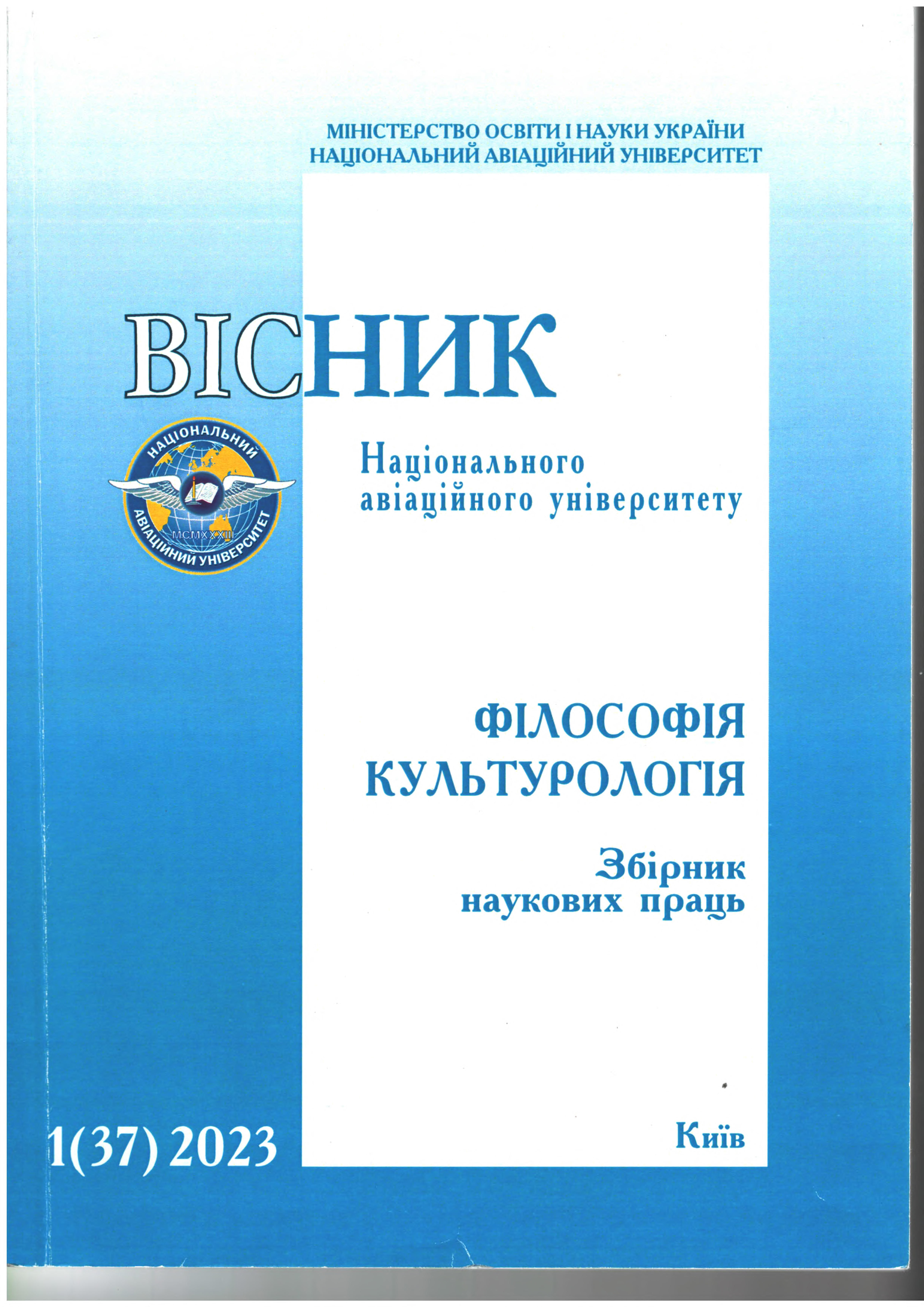THE PRINCIPLES OF EQUIVALENCE, VERSATILITY, OPENNESS, AND COOPERATION AS BASIC COMPONENTS OF THE DEMOCRATIZATION OF SCIENCE
DOI:
https://doi.org/10.18372/2412-2157.37.17574Keywords:
соціально-турбулентний простір, демократизація науки, рівність, різноманітність, відкритість, співробітництвоAbstract
Introduction. In the minds of socially turbulent global trends, the problems of democratization of all spheres of sustainable life are
gaining new relevance and significance. In this context, especially the role played by the nutrition of the democratization of science in its
epistemic, procedural, and collective manifestations. The article details the conceptual and theoretical analysis of the basic principles of
the democratization of modern science, namely of equanimity, cooperation, diversity and openness. The aim of the research is to
identify the interrelationship of the principles of equal opportunities, cooperation, diversity, and openness as principles of
democratization of science. Research methodology. The democratization of science is carried out on the basis of the tradition of the
philosophy of pragmatism, in particular, presented in the philosophical methodology developed by John Dewey and Richard Rorty. Of
particular importance is the clear correlation of a person’s behavior with the principles of activity established by him in accordance with
basic values. In the field of science, these are academic values, in particular, the scientist’s ethos, which was classically analyzed by the
American science theorist Robert Merton. Research results. It is said that the democratization of science is based on the principles of
equal possibilities, cooperation, versatility, and openness. The principle of equal opportunities is especially important in the context of
the security of gender equality and the defense of the other categories of citizens in the face of discrimination, as well as for the security
of scientific communication, which is based on the recognition of freedom and equal partnership. Discussion. The principle of diversity,
orientation towards new ideas and alternative points of dawn, reveals the open space for the new. The principle of openness, which is
based on the knowledge of the fact that no one can have a monopoly on the truth, characterizes the right of a free choice of directly
scientific results, the approval of critical thought, honesty and publicity of science. Conclusions. Freedom to choose the subject of
scientific research is the achievement of a free political system, as it is guilty of protecting it for the sake of diversity and creativity. At the
same time, the beginnings of the freedom of science achieve the development of science and of innovations.
References
Бачинін В. А., Журавський, В. С., Панов М. І. Філософія
права: словник. Київ: Ін Юре, 2003. 408 с.
Бойченко М. І. Соціальні цінності і функціональні
завдання освітньої комунікації: філософське осмислення. Гілея:
науковий вісник. Збірник наукових праць. 2017. Вип. 116.
С. 233-240.
Габермас Ю. Структурні зміни у сфері відкритости; пер. з
нім. А. Онишко. Львів: Літопис, 2000. 317 с.
Єрмоленко А. Дискурс в архітектоніці мовної прагматики.
Філософська думка. 2016. №4. С. 69-86.
Жуковська Г. Г., Левченко К. Б., Остапенко О. О.,
Суслова О. І. Ґендерна політика в нормативно-правових доку-
ментах. Частина 1. За заг. ред. Левченко К. Б. Київ, 2020. 186 с.
Закон України «Про засади запобігання та протидії
дискримінації в Україні». Відомості Верховної Ради, 2013, № 32,
ст. 412. https://zakon.rada.gov.ua/laws/show/5207-17#Text
Кабінет міністрів України. Стратегія упровадження
гендерної рівності та недискримінації у сфері освіти «Освіта:
гендерний вимір – 2020»: Проєкт, 2016. http://genderck.
inf.ua/articles/strategiya-uprovadzhennya-gendernoyi-rivnosti-tanediskriminaciyi-
u-sferi-osviti-osvita-gendernij-vimir-2020
Крочук М. І. Гендерна рівність як складова загального
принципу рівності. Науковий вісник Львівського державного
університету внутрішніх справ. 2011. Вип. 4. С. 464-471.
Кубальський О. Впровадження в університетах наукової
освіти і залучення талановитої молоді до науки. Філософія
освіти. 2022. Том 28 (2). С. 118-128.
Кун Т. Структура наукових революцій; пер. з англ.
О. Васильєва. Київ: Port-Royal, 2001. 228 с.
Луман Н. Поняття цілі і системна раціональність: щодо
функції цілей у соціальних системах; пер. з нім. М. Бойченка та
В. Кебуладзе. К.: Дух і Літера, 2011. 336 с.
Міл Дж. С. Про свободу. Міл Дж. Ст. Про свободу;
Роздуми про представницьке врядування; Поневолення жінок:
Есе. Київ: Основи, 2001. С. 11-130.
Мисюк Ю. І. Рівність права на освіту: міжнародні стандар-
ти та наукові підходи. Вісник Національного університету
«Львівська політехника»: зб. наук. пр. Юридичні науки. Львів,
№ 850. С. 250-253.
Поппер К. Відкрите суспільство та його вороги. В 2-х т.т.
К. : Основи, Т. 1.: У полоні Платонових чар: пер. з англ.
О.Коваленка, 1994. 444 с.
Ранс’єр Ж. Учитель-незнайко. П’ять уроків із розкріпа-
чення розуму; пер. з фр. А. Рєпа. К.: Ніка-Центр, 2013. 168 с.
Рорті Р., Козеллек. Р. Постмодерністський буржуазний
лібералізм; пер. М. Бойченка. Київ: Український філософський
фонд, 1998. С. 5-13.
Рябчук М. Ю. Відкрите суспільство. Дзюба І. М. (ред.).
Енциклопедія Сучасної України: електронна версія. Київ:
Інститут енциклопедичних досліджень НАН України, 2006. URL:
https://esu.com.ua/search_articles.php?id=34385
Фулей Т., Федорович І. Порадник із запобігання та проти-
дії дискримінації. Київ: ПП Видавництво «ФЕНІКС», 2017. 48 с.
Dewey, J. Problems of Man. New York: Philosophical Library,
424 p.
Eliassi-Rad, T., Farrell, H., Garcia, D., Lewandowsky, S.,
Palacios, P., Ross, D., Sornette, D., Thébault, K. & Wiesner, K.What
science can do for democracy: a complexity science approach.
Humanities and social science communications, 2020. 7(1).
Gambini-Buffalo, B. Why diversity is vital fur healthy of
democracy. Futurity. 11.09.2018. https://www.futurity.org/
democracy-diversity-1862262/
Mattila, H. R., & Seeley, T. Genetic diversity in honey bee
colonies enhances productivity and fitness. Science. 2007. Vol.
(5836): 362–364.
Max Planck Society. (2003). Berlin Declaration on Open
Access to Knowledge in the Sciences and Humanities.
https://openaccess.mpg.de/67605/berlin_declaration_engl.pdf
Merton, R. K. (1968). Social Theory and Social Structure.
New York: The Free Press. 702 p.
Open Society Institute. (2001).Budapest Open Access
Initiative. https://www.budapestopenaccessinitiative.org/
Reznik, S., & Fet, V. The destructive role of Trofim Lysenko in
Russian Science. European Journal of Human Genetics. 2019
(9): 1324-1325. doi: 10.1038/s41431-019-0422-5.
UN General Assembly. 68/220. Science, technology and
innovation for development. Resolution adopted by the General
Assembly on 20 December 2013. https://unctad.org/ system/files/
official-document/ares68d220_en.pdf
UN General Assembly. 70/212. International Day of Women
and Girls in Science. Resolution adopted by the General Assembly
on 22 December 2015. https://digitallibrary.un.org/record/821065

